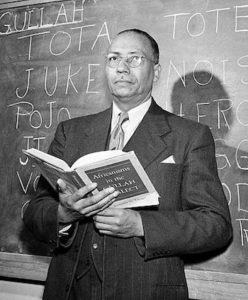
Lorenzo D. Turner
*Lorenzo Turner was born on this date in 1890. He was a Black academic and linguist.
Born in Elizabeth City, North Carolina, Lorenzo Dow Turner was the youngest of four sons of Rooks Turner and Elizabeth Freeman. His father completed his master's degree at Howard University, although he did not begin first grade until he was twenty-one. His mother gained the education allowed for Black women at the time (six years). Two of Turner's brothers earned degrees in medicine and law. Turner's family's strong emphasis on education inspired and helped him achieve his goals.
Turner earned a master's degree from Harvard and a Ph.D. in English literature from the University of Chicago. He taught at Howard University from 1917 to 1928, and during his last eight years, he served as Head of the English Department. After leaving Howard, he founded the Washington Sun newspaper, which closed after one year. From 1929 to 1946, Turner served as Head of the English Department at Fisk University. There, he designed the curriculum for the African Studies Program. In 1946, he began teaching at Roosevelt University in Chicago and chaired the African Studies Program. Turner retired from Roosevelt in 1967.
Turner is best remembered as the father of Gullah studies. His interest in the Gullah people began in 1929 when he first heard Gullah speakers while teaching a summer class at South Carolina State College (now University). Although established scholars then viewed Gullah speech as a form of substandard English, Turner sensed that African languages strongly influenced Gullah. He set out to study the language. For the next 20 years, he traveled to the Gullah region in coastal South Carolina and Georgia, interviewing Gullahs (often isolated) and making detailed notes on their language. He also made recordings in the 1930s of Gullah speakers talking about their culture, folk stories, and other aspects of life.
As part of his studies, Turner traveled to several African locations, specifically Sierra Leone, to learn about the development of Creole languages and to Louisiana and Brazil to study Creole and Portuguese, respectively. He did research at the University of London School of Oriental and African Studies (on various African language systems). He provided context for the obvious "Africanisms" he discovered in his Sea Islands research. "Such depth and breadth allowed Turner to locate Gullah culture and language within the broader complexities of the African diaspora in the New World, ... firmly outside the reductionist theoretical model of cultural assimilation."
His classic work, Africanisms in the Gullah Dialect in 1949, immediately impacted established academic thinking. His study of Gullah's origin, development, and structure was so convincing that scholars quickly accepted his thesis that African languages strongly influence Gullah. He showed the continuity of language and culture across the diaspora. He created a new field of study through his work and an appreciation for a unique element of Black culture.
Lorenzo Turner died of heart failure at Michael Reese Hospital in Chicago, Illinois, on February 10, 1972. His pioneering work, which academics credit for introducing African American studies to U.S. curricula, was the subject of "Word, Shout, Song: Lorenzo Dow Turner Connecting Communities Through Language" at Smithsonian's Anacostia Community Museum in July 2016. The exhibit curator said the Washington, D.C., museum acquired many of Turner's original notes, pictures, and recordings from his widow, Lois Turner Williams, in 2003, who did seminal research on the Gullah language of the Low Country of coastal South Carolina and Georgia.